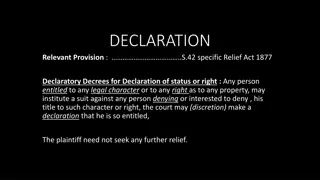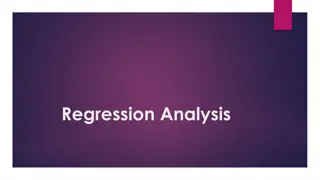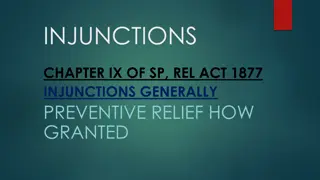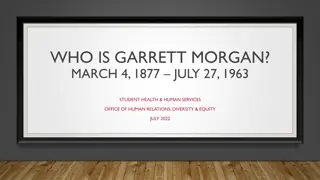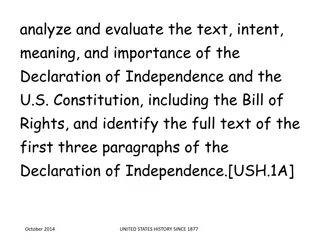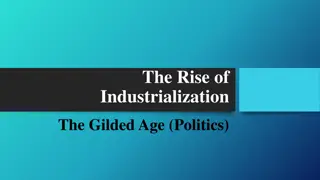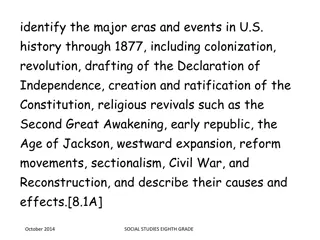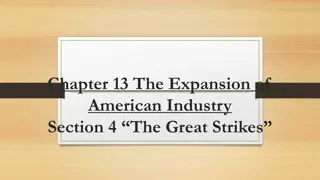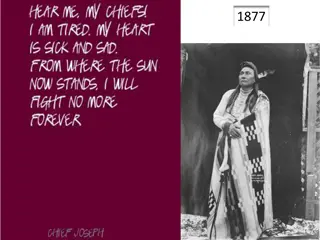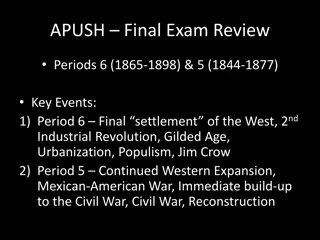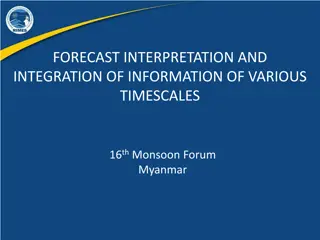Declaratory Decrees and Specific Relief: Understanding Section 42 of the 1877 Act
Section 42 of the Specific Relief Act of 1877 allows individuals to seek court declarations affirming their legal rights or status without necessarily requiring further remedies. The provision aims to protect against challenges to one's title and outlines the effects and limitations of such declarat
0 views • 7 slides
Specific Reliefs under the Specific Relief Act, 1877
The Specific Relief Act, 1877 provides various ways to give specific reliefs, including taking possession, ordering obligations, abstaining from acts, declarations, and appointing receivers. It covers the recovery of immovable and movable property, with specific procedures outlined. The Act allows f
0 views • 32 slides
Understanding Regression Analysis: A Statistical Tool for Relationship Measurement
Regression analysis is a statistical technique developed by Sir Francis Galton in 1877 to measure the relationship between variables, one dependent on the other. This analysis helps estimate unknown values of a dependent variable based on known values of an independent variable. It is widely used in
0 views • 10 slides
Understanding Preventive Relief Through Injunctions in the 1877 Specific Relief Act
Injunctions are a vital judicial remedy to prevent parties from engaging in certain activities. The 1877 Specific Relief Act outlines the granting of preventive relief in the form of injunctions, both temporary and perpetual, based on criteria such as prima facie case, balance of convenience, and ir
0 views • 12 slides
The Legacy of Garrett Morgan: Inventor, Entrepreneur, and Civil Rights Advocate
Garrett Morgan, born in 1877, overcame adversity to become a successful inventor and entrepreneur. He invented life-saving devices like the smoke hood and made significant contributions to society. Despite facing backlash for his race, Morgan's inventions continue to impact modern life, highlighting
0 views • 16 slides
Understanding U.S. History: Founding Documents, Founding Fathers, and Major Eras
Explore the significance of the Declaration of Independence, U.S. Constitution, and Bill of Rights, along with the contributions of notable Founding Fathers. Delve into applying founding principles to historical events and identifying major characteristics and eras in U.S. history, from 1877 to the
0 views • 115 slides
Challenges of Democracy and Corruption in the Gilded Age
The Gilded Age (1877-1900) was a time of political inaction and widespread corruption, raising doubts about the endurance of democracy in the face of powerful corporations and wealthy individuals. The era saw a balance of power with partisan divides making lawmaking difficult. Presidents like Ruther
0 views • 11 slides
Exploring Early American History Through Major Events and Eras
Uncover the pivotal periods in U.S. history up to 1877, detailing key events like colonization, the Revolution, drafting of the Declaration of Independence, and the Civil War. Understand the causes and effects of each era, including religious revivals, westward expansion, reform movements, and Recon
0 views • 94 slides
The Great Strikes and Labor Movement in American Industrial History
The expansion of American industry led to the rise of labor unions and significant labor strikes such as the Great Railroad Strike of 1877, Haymarket Square Riot, Homestead Strike, and Pullman Strike. These events highlighted the struggles between workers and employers, shaping the labor movement's
0 views • 41 slides
Chief Joseph's Powerful Speech and Legacy
Explore the impactful speech of Chief Joseph, leader of the Nez Perce tribe in 1877, as he expresses concerns for his people's welfare and reflects on the injustices they face. Through analyzing the text, uncover the deep emotions, historical context, and significant decisions that shaped Chief Jose
0 views • 14 slides
Key Events and Impacts of Periods 5 and 6 in US History
The content covers key events and impacts of Periods 5 (1844-1877) and 6 (1865-1898) in US history. It includes the settlement of the West, the 2nd Industrial Revolution, the Gilded Age, urbanization, populism, Jim Crow laws, Western expansion, the Mexican-American War, Civil War, and Reconstruction
0 views • 42 slides
Silk Road
\/\/seribangash.com\/\nSilk Road is a term introduced in 1877 by German geographer Ferdinand von Richtofen to describe the trade routes between the Mediterranean basin and the Far East. Silk was one of the main commodities exchanged along these route
0 views • 21 slides
8th Grade STAAR Review Questions on American History
The content provides a set of STAAR review questions for 8th-grade students covering American history from 1607 to 1877. Questions include events in chronological order, historical periods, and interpretations of key historical concepts like Manifest Destiny and the United States Constitution. Stude
0 views • 90 slides
Monsoon Forecast Interpretation and Integration for Myanmar's 16th Monsoon Forum
Explore the Monsoon Intensity Forecast for 2016, L.P.A, Depression, and Storm Forecast, Hazard Calendar for Myanmar, and historical data on Cyclonic Storms crossing the Myanmar coast since 1877. Gain insights into early, mid, and late monsoon predictions, hazards expected throughout the year, and pa
0 views • 8 slides
